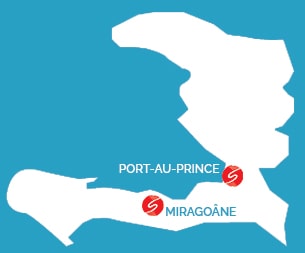SOLIDARITÉS INTERNATIONAL teams reported 20 cases of cholera in Kenscoff, south of Port-au-Prince, between the 1st of May and the 3rd of July 2017. We meet with some key players in the fight against cholera: school staff.
In Haiti the plague of cholera and waterborne diseases are chronic health issues. Rendered vulnerable by recurring natural disasters and a lack of health facilities, Haitian populations must remain alert.
“WASH YOUR HANDS PROPERLY”
On 22nd of June SOLIDARITÉS INTERNATIONAL set up a sensitisation session for 25 students. The purpose was to raise awareness about good hygiene practices as to prevent waterborne diseases, especially cholera. The school principal in Kenscoff, Fortuné Emmaniste agrees that teaching children to wash their hands properly was “extremely important. As Director of two schools in the community, I have been working in alongside SOLIDARITÉS INTERNATIONAL teams a few times. Satisfied with their work, I decided to take the collaboration further,” he says. “The message may seem simple, but it helps improve community healthcare. Children spread the word to their parents, friends, neighbours… Growing up they will pass the message to their own children.”
POSITIVE RESULTS
The collaborative strategy between the Minister for Public Health and Population (MSPP) and the humanitarian actors is paying off. National cholera reduction data is positive.
In 2011, the MSPP suspected 352,033 cases of illness. In 2016 this decreased to 41,421. Between the 1st of January and the 15th of July 2017, the MSPP registered only 7,901 cases. This effort is indeed confirmed by a nationwide decrease.
If this trend continues, cholera could be eradicated by the end of 2018. In the meantime our teams will keep taking action in the country to help disaster-stricken populations and respond to their needs.
Help the haitian people
Haiti
Context and action- 11.84 million inhabitants
- 163rd out of 191 countries on the Human Development Index
- 110.215 people helped

